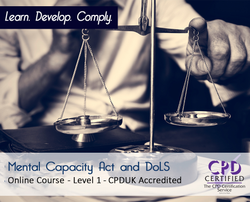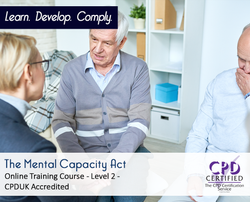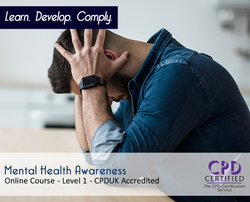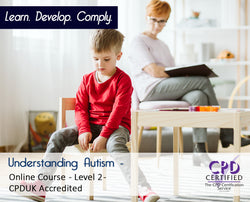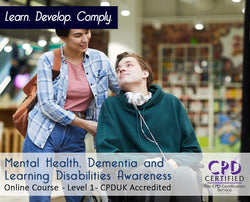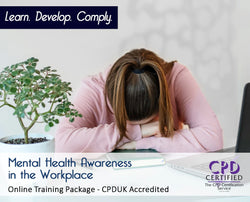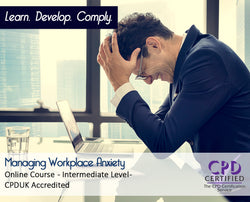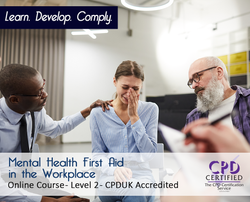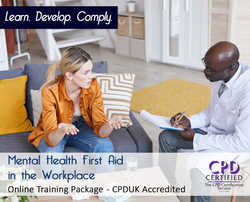Mental Health eLearning Courses & Training - ComplyPlus LMS™ - The Mandatory Training Group UK -
Mental Health eLearning Courses & Training
Mental health in the UK is a significant concern, impacting individuals and society. The prevalence of mental health conditions, such as anxiety, depression, and stress-related disorders, is considerable. The National Health Service (NHS) is a primary provider of mental health services, offering treatments ranging from counselling to medication and specialist interventions.
However, the sector faces challenges, including long waiting times and variations in service quality and availability across regions. There's a growing emphasis on early intervention and improving access to services, partly through digital health solutions.
Mental health awareness is increasing, reducing stigma and encouraging more people to seek help. Private sector and charity organisations also play crucial roles in support and advocacy. The government's policies and funding decisions are pivotal in shaping the landscape of mental health care and support services in the UK. #MentalHealthTraining
Explore our extensive range of Online Mental Health Courses on ComplyPlus LMS™ – Click to learn more
Online mental health courses & training
In the UK, mental health courses and training are vital for professionals and the wider public. They aim to enhance understanding, foster empathy, and develop practical skills for supporting individuals with mental health issues. Training ranges from basic awareness to specialised courses for healthcare professionals, covering topics like mental health first aid, managing stress, and understanding specific conditions like depression and anxiety.
Providers include educational institutions, healthcare organisations, and charities. These courses play a crucial role in de-stigmatising mental health, promoting early intervention, and improving the quality of care and support available to individuals across various settings. #MentalHealthAwareness
Boost your knowledge with our Mental Health Awareness eLearning Courses on ComplyPlus LMS™ – Start now
Key definitions
Understanding the key terms in mental health is crucial for clear communication and effective support. Here are some definitions:
-
Mental health - A state of well-being in which an individual realises their own abilities, can cope with the normal stresses of life, works productively, and can contribute to their community.
-
Mental illness - A broad range of medical conditions (such as major depression, schizophrenia, obsessive-compulsive disorder, or panic disorder) that affect a person's thinking, feeling, mood, ability to relate to others, and daily functioning.
-
Well-being - Refers to a person's experience of health, happiness, and prosperity. It includes having good mental health, high life satisfaction, a sense of meaning or purpose, and the ability to manage stress.
-
Stigma - The disapproval of, or discrimination against, a person based on perceivable social characteristics that serve to distinguish them from other members of society.
-
Psychosis - A mental disorder characterised by a disconnection from reality. Symptoms may include delusions, hallucinations, disorganised thinking, and lack of insight.
-
Anxiety disorders - A group of mental illnesses that cause constant and overwhelming anxiety and fear. These disorders can significantly impair daily activities.
-
Depression - A common and serious medical illness that negatively affects how you feel, the way you think, and how you act. It causes feelings of sadness and/or a loss of interest in activities once enjoyed.
-
Cognitive Behavioural Therapy (CBT) - A type of psychotherapeutic treatment that helps patients understand the thoughts and feelings that influence behaviours. CBT is commonly used to treat a wide range of disorders, including phobias, addiction, depression, and anxiety.
-
Resilience - The ability of a person to adapt well in the face of adversity, trauma, tragedy, threats, or significant sources of stress.
-
Mindfulness - A mental state achieved by focusing one's awareness on the present moment while calmly acknowledging and accepting one's feelings, thoughts, and bodily sensations, used as a therapeutic technique.
These definitions form a basic framework for understanding mental health and its related concepts. #MentalHealthFirstAid
Get certified in Mental Health First Aid with our comprehensive online learning programs on ComplyPlus LMS™ – Enroll today
Mental Health First Aid (MHFA)
Mental Health First Aid (MHFA) is an educational course designed to teach individuals how to identify, understand, and respond to signs of mental illnesses and substance use disorders. It aims to provide the skills needed to reach out and provide initial support to someone who may be developing a mental health or substance use problem and help connect them to appropriate care.
The primary goals of MHFA are to:
-
Raise awareness - Increase understanding of mental health issues and de-stigmatise mental illness.
-
Identify early signs - Teach individuals how to recognise early signs of mental health problems or crises, including how to understand and respond to signs of mental illnesses and substance use disorders.
-
Provide support - Empower individuals with the skills to provide initial help and support to someone who may be experiencing a mental health issue or crisis.
-
Guide to professional help - Guide individuals in need towards appropriate professional resources for proper diagnosis and treatment.
MHFA courses are often compared to traditional first aid or CPR training, providing help to improve mental health literacy and helping communities with the knowledge and skills to support those in need. #MentalHealthSupport
Address Mental Health Problems effectively with our targeted E-learning Courses on ComplyPlus LMS™ – Browse courses now
Legislation, regulations and expert guidance
In the UK, mental health is governed by key legislation like the Mental Health Act 1983 (recently reviewed) and the Mental Capacity Act 2005, ensuring the rights and safety of individuals with mental health issues. Regulations are overseen by bodies such as England's Care Quality Commission (CQC).
Expert guidance is provided by the National Institute for Health and Care Excellence (NICE), offering evidence-based recommendations on mental health treatment and care. Professional bodies like the Royal College of Psychiatrists also contribute guidelines, ensuring practitioners deliver care informed by the latest research and best practices. #MentalWellbeing
Access our Free Mental Health Conditions Online Training Courses exclusively on ComplyPlus LMS™ – Grab this opportunity
Regulatory and professional bodies
In the UK, the Care Quality Commission (CQC) regulates all health and social care services, ensuring standards in mental health provision. The Health and Care Professions Council (HCPC) regulates psychologists and other health professionals. Psychiatrists are overseen by the Royal College of Psychiatrists (RCPsych), ensuring clinical excellence.
The British Psychological Society (BPS) provides guidance and support for psychology professionals. Additionally, the Nursing and Midwifery Council (NMC) and the General Medical Council (GMC) regulate nurses and doctors, respectively, including those specialising in mental health. These bodies play crucial roles in maintaining professional standards and safeguarding patient welfare. #WorkplaceWellness
Become a certified trainer with our Online Mental Health Train the Trainer Courses on ComplyPlus LMS™ – Join now
Relevant national occupational standards
In the UK, the relevant National Occupational Standards (NOS) for mental health outline competencies required for various roles within the sector. These standards cover areas such as promoting mental health and well-being, supporting individuals with mental health conditions, and crisis intervention. They apply to various professionals, from healthcare, social care, and community support.
Skills for Health and Skills for Care provide detailed frameworks, ensuring practitioners deliver care based on respect, dignity, and equality principles. The NOS guides training and development, ensuring a skilled workforce capable of meeting diverse needs within mental health services. #MentalHealthMatters
Advance your career with our Mental Health Awareness Distance Learning and Online Courses on ComplyPlus LMS™ – Check them out
CQC key questions and fundamental standards
For mental health services in England, the CQC evaluates providers based on five key questions: Are they safe, effective, caring, responsive to people's needs, and well-led? Additionally, the CQC enforces fundamental standards below which care must never fall, including person-centred care, dignity and respect, consent, safety, safeguarding from abuse, food and drink, premises and equipment, complaints, governance, staffing, fit and proper staff, duty of candour, and display of ratings. These standards ensure that mental health services provide high-quality care, respect individual needs, and maintain a safe, responsive, and well-managed environment. #OnlineMentalHealthCourses
Discover the latest in Mental Health First Aid Online Learning, exclusively available on ComplyPlus LMS™ – Click to start
Ofsted recommendations regarding mental health
In the UK, Ofsted (Office for Standards in Education, Children's Services and Skills) places significant importance on mental health and well-being in educational settings. Key recommendations include:
-
Whole-school approach - Implement a whole-school approach to promoting mental health and well-being. This involves integrating mental health into the curriculum, staff training, and developing a supportive school culture.
-
Staff training - Ensure that staff are trained to identify mental health issues early, understand how to refer to appropriate support, and know how to provide initial support and care.
-
Curriculum integration - Include mental health and well-being education in the curriculum to equip students with knowledge and skills to understand and manage their own mental health.
-
Support services - Provide access to school-based mental health services and ensure clear referral pathways to specialist services when needed.
-
Student voice - Encourage student participation in developing mental health policies and practices, ensuring their views and needs are considered.
-
Parental engagement - Engage with parents and carers to support their understanding of mental health issues and the school's approaches to promoting mental well-being.
-
Monitoring and evaluation - Regularly monitor and evaluate mental health strategies to ensure they are effective and meet the needs of students and staff.
Ofsted inspections consider how well schools support students' mental health and well-being, looking at both the curriculum and the wider school environment. #ComplyPlusLMS
Empower yourself with comprehensive Mental Health Problems E-Learning Courses on ComplyPlus LMS™ – Your journey begins here
Health and safety recommendations regarding mental health
The Health and Safety Executive (HSE) in the UK recognises mental health as an integral part of occupational health. Their recommendations for mental health focus on addressing work-related stress and creating mentally healthy workplaces. Key aspects include:
-
Risk assessment - Employers should assess the risk of work-related stress and implement measures to control and reduce these risks, considering factors like demands, control, support, relationships, role, and change.
-
Management standards - HSE provides Management Standards that define the characteristics of an organisation where the risks from work-related stress are effectively managed and controlled.
-
Policy development - Encourage employers to develop a clear policy on mental health, including prevention, early identification, support, and return-to-work processes.
-
Training and awareness - Provide training for managers and staff to recognise and manage work-related stress and promote a culture where employees feel able to discuss mental health openly.
-
Support systems - Implement support mechanisms, such as Employee Assistance Programs (EAPs), counselling services, and mental health first-aiders.
-
Regular consultation - Engage employees in discussions about their work and how they can be supported, ensuring that any measures to manage stress and mental health are fitting and effective.
-
Monitoring and review - Regularly review the effectiveness of actions taken to manage work-related stress and improve mental health, adjusting approaches as necessary.
HSE emphasises employers' legal duty to ensure their employees' health, safety, and welfare, which includes managing and supporting mental health at work. #UKMentalHealth
Unlock Free Mental Health Conditions Training Courses online and elevate your expertise with ComplyPlus LMS™ – Sign up for free
Aims, objectives and learning outcomes
Aims
The primary aim of mental health courses is to enhance the understanding, awareness, and responsiveness towards mental health issues. The courses aim to equip participants with the knowledge and skills to identify, understand, and effectively support individuals facing mental health challenges, fostering a compassionate and informed society. Additionally, they aim to reduce the stigma associated with mental health issues, encouraging open dialogue and early intervention.
Objectives
- To provide comprehensive knowledge about various mental health conditions, their prevalence, and impact.
- To train participants in identifying early signs of mental health issues and understanding the pathways for support and treatment.
- To develop practical skills in offering initial help in mental health crises and guiding individuals to professional help.
- To enhance communication skills, enabling participants to discuss mental health sensitively and effectively.
- To promote understanding of self-care strategies for maintaining one's own mental well-being.
Learning Outcomes
By the end of the course, participants should be able to:
- Recognise the signs and symptoms of common mental health issues.
- Demonstrate an understanding of the principles of early intervention and the importance of appropriate referral.
- Apply basic support and listening skills to provide initial help to someone experiencing a mental health issue or crisis.
- Communicate about mental health challenges respectfully and effectively, reducing stigma and promoting awareness.
-
Implement strategies for managing personal mental well-being and recognise the importance of self-care for individuals working in support roles. #MentalHealthLegislation
Lead the change with our Online Mental Health Train the Trainer Courses, available now on ComplyPlus LMS™ – Take the first step
Why are mental health training courses important?
Mental health training courses are crucial as they equip individuals with the knowledge and skills to recognise, understand, and act on mental health issues, fostering early intervention and support. They play a pivotal role in de-stigmatising mental health, promoting empathy, and encouraging open conversations.
This training enhances workplace productivity and well-being by addressing work-related stress and creating supportive environments. By empowering people to support themselves and others effectively, these courses contribute to a more informed, resilient, and mentally healthy community, ultimately reducing the burden on healthcare systems and improving societal health outcomes. #MentalHealthElearning
Elevate your understanding with top-tier Mental Health Awareness eLearning Courses on ComplyPlus LMS™ – Click to advance
Mental health distance learning courses & training
Mental health distance learning courses and training offers flexible, accessible education on mental health, suitable for a wide audience. These online programs cover various topics, from awareness and understanding of mental health issues to specific intervention strategies. They cater to professionals seeking to enhance their skills and individuals aiming to support their well-being or that of others. Features include interactive content, expert-led instruction, and practical assessments.
These courses provide the convenience of self-paced learning, allowing participants to absorb and reflect on the material deeply, making them a valuable resource for personal and professional development in mental health. #MentalHealthAtWork
Master Mental Health First Aid through our detailed online learning modules on ComplyPlus LMS™ – Your learning path awaits
Mental Health Online Training Courses
Mental health online training courses provide an accessible, flexible means to gain insight and skills related to mental health care and support. They encompass a range of topics, from basic awareness and understanding to specialised training for professionals. These courses often include modules on identifying mental health issues, offering first aid, and understanding therapeutic approaches.
Interactive, multimedia content and assessments ensure engaging, effective learning. Ideal for individuals, healthcare professionals, or corporate teams, these courses facilitate lifelong learning, promote mental well-being, and support the creation of supportive, informed environments in various settings, all accessible from the comfort of one's home or office. #MentalHealthAdvocacy
Master Mental Health First Aid through our detailed online learning modules on ComplyPlus LMS™ – Your learning path awaits
Free mental health E-Learning courses & training
Free mental health E-Learning courses offer an invaluable resource for individuals and professionals seeking to understand and support mental well-being without financial barriers. These courses cover a variety of topics, including awareness of mental health conditions, coping strategies, and support techniques. They often provide foundational knowledge, practical advice, and resources for further learning or help.
With flexible, self-paced formats, these courses make learning accessible to a wider audience, fostering a more informed and empathetic society. They are particularly beneficial for raising awareness, promoting early intervention, and enhancing the skills of those who may encounter mental health issues in personal, community, or professional settings. #MentalHealthEducation
Tackle Mental Health Problems head-on with our expert E-learning Courses on ComplyPlus LMS™ – Start your educational journey now
Mental health train the trainer eLearning courses & training
Mental Health Train the Trainer eLearning courses equip participants to become instructors in mental health awareness and support within their organisations or communities. These comprehensive programs cover in-depth content on various mental health topics, teaching methodologies, and strategies to engage and educate adults effectively.
Participants learn to deliver training confidently, handle sensitive topics with care, and create an impactful learning environment. The courses often include resources like session plans, presentation materials, and evaluation tools. This format ensures a cascading effect, empowering trainers to disseminate crucial mental health knowledge and skills widely, fostering supportive, well-informed environments. #CorporateMentalHealth
Access top-rated Free Mental Health Conditions Online Training Courses on ComplyPlus LMS™ – Click to claim your access
Mental health on ComplyPlus LMS™
The Mandatory Training Group is a leading UK provider of accredited mental health courses and training available on ComplyPlus LMS™
Professional body recommendations and published best practice guidance
For mental health training courses, recommendations and best practices from professional bodies like the Royal College of Psychiatrists, the British Psychological Society, and the National Institute for Health and Care Excellence (NICE) are paramount. They emphasise evidence-based approaches, ethical standards, and continual professional development. Published best practice guidance often includes integrating lived experience, ensuring cultural competence, and maintaining confidentiality.
Peer-reviewed literature, such as articles from the "Journal of Mental Health Training, Education, and Practice" and "Psychiatric Services," offers empirical evidence supporting the effectiveness of various training methods and interventions, ensuring that training is both impactful and grounded in current research. #MentalHealthCompliance
Embark on your learning journey with Mental Health Awareness Distance Learning and Online Courses on ComplyPlus LMS™ – Explore now
Guidance for managers and leaders
For leaders and managers, recognising and effectively managing mental health in the workplace is crucial for fostering a positive, productive environment. Here's guidance on understanding its importance and implementing effective policies and procedures:
Understanding the importance
-
Productivity and engagement - Good mental health is linked to better employee performance, engagement, and satisfaction.
-
Retention - Supporting mental health can reduce absenteeism and turnover rates.
-
Legal compliance - Awareness of and adherence to mental health regulations protects the organisation from legal and financial repercussions.
Implementing effective policies and procedures
-
Develop a clear policy - Create a mental health policy that outlines your commitment, the support options available, and the process for seeking help. Ensure it aligns with the latest legislation, like the Equality Act 2010, Health and Safety at Work, etc. Act 1974.
-
Educate and train - Provide regular training to all employees, especially managers, on mental health awareness, company policies, and how to support colleagues.
-
Promote openness and support - Encourage open dialogue about mental health, destigmatise mental health issues, and ensure employees know where and how to access support services.
-
Regularly review and adapt - Stay informed about updates in legislation and best practices from reputable bodies such as the Health and Safety Executive (HSE) and the National Institute for Health and Care Excellence (NICE). Regularly review and update policies accordingly.
-
Provide resources - Offer or signpost to resources such as Employee Assistance Programs (EAPs), counselling services, and stress management workshops.
-
Monitor and support - Implement a system for monitoring workplace mental health, and have a clear, supportive process for those returning to work after a mental health-related absence.
By prioritising mental health, leaders and managers can cultivate a supportive, resilient, and high-performing workforce, ensuring organisational well-being and success. #MentalHealthProfessionals
Gain critical skills with our Online Mental Health Courses, tailored for you on ComplyPlus LMS™ – Discover more today
Mental health policy and procedures
When drafting comprehensive mental health policies and procedures, managers and leaders should:
-
Align with UK legislation - Ensure compliance with the Health and Safety at Work etc. Act 1974, Equality Act 2010, and Mental Health Act 1983. Incorporate standards from the Health and Safety Executive (HSE) and Care Quality Commission (CQC).
-
Incorporate international guidelines - Refer to the World Health Organisation's "Mental Health Action Plan" for global best practices.
-
Define scope and objectives - Clearly state the purpose, scope, and objectives, emphasising commitment to mental health and well-being.
-
Establish roles and responsibilities - Define responsibilities at all levels, ensuring accountability and ownership.
-
Detail support mechanisms - Include information on support services, such as Employee Assistance Programs (EAPs), counselling services, and reasonable adjustments.
-
Set procedures - Outline clear, confidential procedures for reporting issues, seeking help, and managing absences related to mental health.
-
Training and awareness - Mandate regular mental health awareness and training sessions.
-
Review and update - Regularly review the policy to ensure ongoing relevance and compliance with any legislative changes or best practices. #MentalHealthAwarenessTraining
Elevate your team's skills with Mental Health Awareness eLearning, available exclusively on ComplyPlus LMS™ – Learn more here
Legislation and regulations
UK legislation, including the Health and Safety at Work etc. Act 1974 and the Equality Act 2010 mandate employers to safeguard employees' mental and physical health. The Health and Safety Executive (HSE) outlines specific guidelines for managing work-related stress, underlining the importance of creating supportive, stigma-free environments. #MentalHealthBestPractices
Seize the opportunity for Free Mental Health Conditions Training online, courtesy of ComplyPlus LMS™ – Register for free today
Best practices for mental health support
Adopting best practices is crucial. This includes:
-
Policy implementation - Crafting clear, comprehensive mental health policies.
-
Regular training - Ensuring staff are equipped to identify and support mental health challenges.
-
Open communication channels - Fostering an environment where mental health can be discussed openly and without judgment.
-
Access to support services - Providing resources such as counselling and mental health first aid. #MandatoryTrainingMentalHealth
Forge your path as a trainer with our Online Mental Health Train the Trainer Courses on ComplyPlus LMS™ – Claim your spot now
Conclusion
Effective mental health support transforms workplaces and educational settings, cultivating a positive atmosphere that benefits individuals and the organisation as a whole. It’s not just about compliance; it’s about building a resilient, productive, and empathetic society.
Are you ready to take the lead in mental health support within your organisation? Discover our comprehensive mental health courses to equip you with the knowledge and skills needed to create a thriving, supportive environment. Enrol today and be the change you wish to see in your workplace! #MentalHealthResources
Dive into our Mental Health Awareness Distance Learning and Online Courses on ComplyPlus LMS™ – Your future awaits
Frequently Asked Questions About Mental Health eLearning courses
What is the significance of mental health training in the workplace?
Mental health training is crucial for creating a supportive and productive work environment, helping to identify and address mental health issues early, reducing stigma, and ensuring compliance with UK legislation like the Health and Safety at Work etc. Act 1974.
How does ComplyPlus LMS™ support mental health training?
ComplyPlus LMS™ offers a comprehensive platform for delivering and tracking mental health training, ensuring easy access to courses, managing compliance, and monitoring the effectiveness of the training programs.
What are the key UK legislations governing workplace mental health?
Key legislations include the Health and Safety at Work etc. Act 1974, the Equality Act 2010, and the Mental Health Act 1983 set out employers' responsibilities for ensuring mental well-being at work.
How often should mental health training be refreshed in the workplace?
Best practice suggests that mental health training should be refreshed annually to keep up with the latest practices and ensure ongoing awareness.
Can mental health training help comply with the Health and Safety Executive (HSE) guidelines?
Yes, mental health training is a significant component of complying with HSE guidelines by helping to manage work-related stress and promoting a supportive work environment.
What role does ComplyPlus LMS™ play in adhering to mental health regulations?
ComplyPlus LMS™ ensures that all training is up-to-date with current legislation and best practices, providing a centralised system for managing and reporting on training compliance.
What is the importance of a mental health policy in the workplace?
A mental health policy is essential for setting out an organisation's commitment to mental well-being, outlining support mechanisms, and ensuring a structured approach to managing mental health.
How can ComplyPlus LMS™ assist in implementing a mental health policy?
ComplyPlus LMS™ can disseminate the mental health policy across the organisation, track acknowledgement of the policy by employees, and provide necessary training aligned with the policy.
What are the benefits of online mental health training courses?
Online mental health training offers flexibility, accessibility, and the ability to effectively track and measure engagement and comprehension.
Does ComplyPlus LMS™ offer customisation for mental health training programs?
Yes, ComplyPlus LMS™ offers customisation options to tailor the training content to your organisation's specific needs and policies.
Are mental health training courses suitable for all types of organisations?
Absolutely, mental health training is crucial for all organisations, regardless of size or industry, to ensure a healthy and productive work environment.
How does mental health training impact employee productivity?
Mental health training can significantly improve employee productivity by reducing absenteeism, enhancing engagement, and promoting better overall mental well-being.
Can ComplyPlus LMS™ track the effectiveness of mental health training?
Yes, ComplyPlus LMS™ provides tools for assessing the effectiveness of training through feedback, assessments, and monitoring of training completion rates.
What is the role of leadership in mental health training?
Leadership is crucial for championing mental health training, setting a positive example, and ensuring that mental well-being is a strategic priority in the organisation.
How can ComplyPlus LMS™ be integrated with existing HR systems for comprehensive mental health training management?
ComplyPlus LMS™ can be integrated with existing HR systems to streamline training records management, ensure easy access to training resources, and provide comprehensive reporting capabilities. #DigitalMentalHealth
Unlock the potential of Online Mental Health Courses, designed for success on ComplyPlus LMS™ – Click to start your journey
Why choose ComplyPlus LMS™ for mental health e-learning courses?
Choose ComplyPlus LMS™ from The Mandatory Training Group UK for a seamless, efficient approach to mental health training. Our cutting-edge platform ensures your organisation stays ahead of compliance with tailored courses that meet the latest UK legislation and best practices. Enjoy engaging content, robust tracking, and easy integration with your existing systems. Empower your team with the knowledge and skills to foster a supportive, productive workplace. Don't just comply—excel with ComplyPlus LMS™. Start your transformative journey today. #ElearningForWellbeing
Join our mission to spread mental health awareness. Check out our mental health eLearning courses today
Mental Health eLearning Courses & Training - ComplyPlus LMS™ - The Mandatory Training Group UK -




